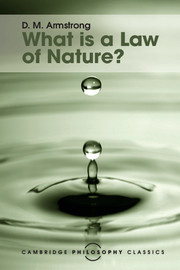Book contents
- Frontmatter
- Dedication
- Contents
- Preface to this edition
- Acknowledgements
- Part I A critique of the Regularity theory
- Part II Laws of nature as relations between universals
- 6 Laws of nature as relations between universals
- 7 Functional laws
- 8 Uninstantiated laws
- 9 Probabilistic laws
- 10 Further considerations concerning the form of laws
- 11 Are the laws of nature necessary or contingent?
- Conclusions
- Works cited
- Index
10 - Further considerations concerning the form of laws
from Part II - Laws of nature as relations between universals
Published online by Cambridge University Press: 05 July 2016
- Frontmatter
- Dedication
- Contents
- Preface to this edition
- Acknowledgements
- Part I A critique of the Regularity theory
- Part II Laws of nature as relations between universals
- 6 Laws of nature as relations between universals
- 7 Functional laws
- 8 Uninstantiated laws
- 9 Probabilistic laws
- 10 Further considerations concerning the form of laws
- 11 Are the laws of nature necessary or contingent?
- Conclusions
- Works cited
- Index
Summary
After introducing the conception of laws of nature both as relations holding between universals, and as universals, in Chapter 6, we tried in the next three chapters to extend the account to functional laws, to uninstantiated laws and to probabilistic laws. It was argued that functional laws are higher-order laws: laws which dictate, or in some possible cases merely govern, lower-order laws. It was argued that uninstantiated laws are not really laws at all, but are rather counterfactuals about what laws would hold if certain conditions were realized. In the case of probabilistic laws it was argued that our original schema can be applied fairly straightforwardly. Such laws give probabilities of necessitation, probabilities less than probability 1. Deterministic laws are laws where the probability of necessitation is 1.
There are a great many other questions to be considered concerning the possible forms which a law of nature can take. In this chapter various of these issues will be taken up.
Scientific identification
We may begin from the point that, if our general account of laws of nature is to be sustained, they must contain at least two universals. What then of theoretical identifications, such as the identification of temperature with mean kinetic energy, or laws of universal scope, that is, laws having the form: it is a law that everything is F? The present section will be devoted to theoretical identification.
Consider the identification of water with H2O, temperature with mean kinetic energy, inertial mass with gravitational mass. Are they laws of nature? They are certainly purely general scientific truths, discovered a posteriori. (It is a matter of current dispute whether they are necessary or contingent truths. I favour the latter view, but the matter need not be argued here.) If water is H2O, to take this as our example, then we have two universally quantified generalizations: all samples of water are made up of H2O molecules, all collections of H2O molecules are samples of water. Is it laws which are instantiated in each instance falling under the generalizations? It is interesting to notice that, given the Molnar definition of the Regularity theory of laws of nature (Ch. 2, Sec. 1), and given further that the generalizations are contingent, the generalizations qualify as laws of nature.
- Type
- Chapter
- Information
- What is a Law of Nature? , pp. 128 - 147Publisher: Cambridge University PressPrint publication year: 2016



